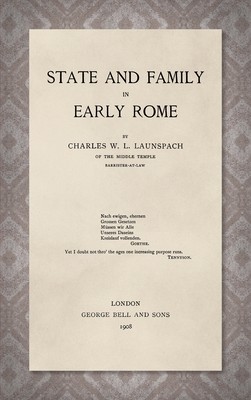![State and Family in Early Rome [1908]](https://thumb-eu.knygos-static.lt/TR9sk9s5ReykrPWF0P4XEJowiuE=/fit-in/0x60/images/books/11277742/9781584775423.jpg)
- We will send in 10–14 business days.
- Author: Charles W L Launspach
- Publisher: Lawbook Exchange, Ltd.
- ISBN-10: 1584775424
- ISBN-13: 9781584775423
- Format: 15.2 x 22.9 x 2.2 cm, kieti viršeliai
- Language: English
- SAVE -10% with code: EXTRA
Reviews
Description
Launspach, a barrister and member of the Inner Temple, argues that in its "infancy and adolescence" early Rome was "a conscious imitation of the ancient Gens or ancient Family, that its theory of government was founded upon the relations existing between kinsmen, and that these again, were determined by religious notions which later became transformed through developments with the City and external influences" (Foreword, v). Consequently, the early state was neither a democracy nor an autocracy. When expansion and internal change drew the Roman commonwealth away from its familial roots, the underlying assumptions that had bound the state fragmented and the constitutional order was gradually supplanted by more authoritarian structures.
xx, 288 pp.EXTRA 10 % discount with code: EXTRA
The promotion ends in 21d.23:15:29
The discount code is valid when purchasing from 10 €. Discounts do not stack.
- Author: Charles W L Launspach
- Publisher: Lawbook Exchange, Ltd.
- ISBN-10: 1584775424
- ISBN-13: 9781584775423
- Format: 15.2 x 22.9 x 2.2 cm, kieti viršeliai
- Language: English English
Launspach, a barrister and member of the Inner Temple, argues that in its "infancy and adolescence" early Rome was "a conscious imitation of the ancient Gens or ancient Family, that its theory of government was founded upon the relations existing between kinsmen, and that these again, were determined by religious notions which later became transformed through developments with the City and external influences" (Foreword, v). Consequently, the early state was neither a democracy nor an autocracy. When expansion and internal change drew the Roman commonwealth away from its familial roots, the underlying assumptions that had bound the state fragmented and the constitutional order was gradually supplanted by more authoritarian structures.
xx, 288 pp.

Reviews